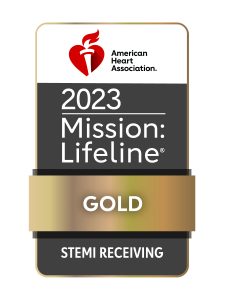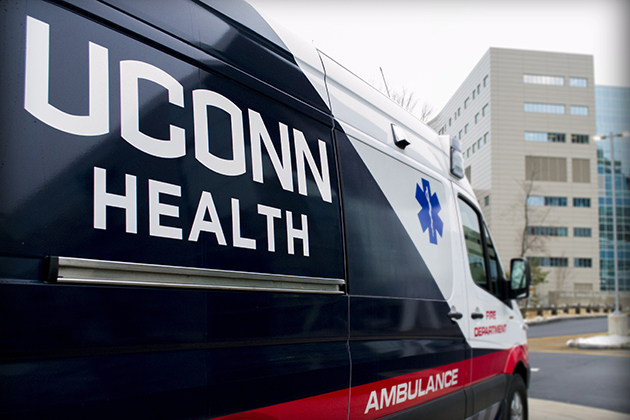 Congratulations to UConn Health and its UConn John Dempsey Hospital. The American Heart Association has recognized UConn for the ninth consecutive year with its Mission: Lifeline®-STEMI Receiving Center – Gold award.
Congratulations to UConn Health and its UConn John Dempsey Hospital. The American Heart Association has recognized UConn for the ninth consecutive year with its Mission: Lifeline®-STEMI Receiving Center – Gold award.
UConn Health is recognized once again for its rapid, evidence-based care of patients experiencing a specific type of heart attack known as an ST elevation myocardial infarction (STEMI), more severe and dangerous than other types of heart attacks.
The Mission: Lifeline Receiving Center award demonstrates UConn’s teaching hospital’s commitment to treating patients according to the most up-to-date, research-based guidelines for STEMI care as outlined by The American Heart Association.
Each year, about 285,000 people in the U.S. experience this type of dangerous STEMI heart attack, caused by a complete blockage in a coronary artery. Nearly 40% of people who go to the emergency department with acute coronary syndrome are diagnosed with a STEMI. STEMI heart attacks require timely treatment to restore blood flow as quickly as possible.
Mission: Lifeline is a national, community-based initiative improving systems of care for patients with STEMI, non-ST elevation myocardial infarction (NSTEMI), stroke and out-of-hospital cardiac arrest. The program focuses on streamlining processes to speed the delivery of proper treatment for time sensitive, neuro-cardiovascular disease states. In July, UConn Health also received the Association’s Get With The Guidelines® – Stroke Gold Plus award.
“Care coordination is particularly important when someone experiences a STEMI heart attack, and American Heart Association guidelines call for specific actions in the hospital and following a hospital stay,” said James G. Jollis, M.D., volunteer for the American Heart Association’s Get With The Guidelines® – Coronary Artery Disease Systems of Care Advisory Work Group. “Organizations like UConn Health and its UConn John Dempsey Hospital are recognized for consistently supporting patients with science-based treatment and care coordination, ensuring the best opportunity for recovery.”
UConn’s teaching hospital is well-known for its rapid, lifesaving heart attack care. UConn John Dempsey Hospital staff are on call 24/7 to treat STEMI heart attack patients with lifesaving care at a moment’s notice inside the cardiac catheterization lab at UConn Health’s Calhoun Cardiology Center. The on-call multidisciplinary team includes paramedics, Emergency Department personnel, Cardiac Catheterization Laboratory staff, interventional cardiac specialists, physicians, nurses, EMTs, staff, telephone operators, and administrators.
“UConn Cardiology, ED and EMS teams continue to be leaders in lifesaving heart attack care for the ninth year in a row,” says Peter Canning, EMS Coordinator for UConn John Dempsey Hospital.
“We are so proud of the success of our STEMI care team, Calhoun Cardiology Center and our Emergency Department,” says Dr. Christopher Pickett, medical director of UConn Health’s Calhoun Cardiology Center.
For example, if ambulance paramedics suspect a patient is having a STEMI heart attack based on an electrocardiogram test (EKG), a STEMI Alert is radioed immediately to UConn John Dempsey Hospital from the patient’s home or location to activate the Emergency Department and the Cardiac Catheterization Laboratory to be prepared to treat the heart attack patient. Even if it is in the middle of the night, on-call staff will be at the ready to care for the patient.
Once a STEMI patient arrives at UConn John Dempsey Hospital’s ED they are swiftly taken to the Cardiac Cath Lab for a lifesaving minimally invasive procedure known as a percutaneous coronary intervention (PCI) to open any narrowed or blocked coronary arteries. UConn Health’s interventional cardiology team is well-known for their pioneering use of minimally invasive cardiac interventions through a patient’s wrist artery rather than via traditional groin artery access.
For more information on the American Heart Association’s recognitions, visit Heart.org/Quality.



